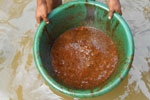Yesterday, Royal Dutch Shell estimated that to date 54,600 gallons of oil had spilled into the North Sea off the east coast of Scotland, spreading some 19 miles wide (30 kilometers) at its maximum. While the company stopped the initial leak on Thursday, it has now announced that the oil has found a ‘second pathway’ and is still leaking into the sea around 84 gallons a day.
Glen Cayley, technical director of Shell’s exploration and production activities in Europe, told the BBC that it would not yet discuss the cause of the oil spill, but it will be subject to an independent investigation. He added that the company ‘deeply regrets this spill’.
The spill comes from Shell’s Gannet Alpha oil platform, which is 113 miles (180 kilometers) off of Aberdeen, Scotland.
The Scotland director for the Royal Society for the Protection of Birds (RSPB), Stuart Housden, told The Scotsman, that the spill potentially threatens thousands of sea birds and, according to data, was the worst in the region for over ten years.
The company has been criticized for not making the leak public until two days after they noticed the spill.
Shell was recently granted preliminary permission by the Obama Administration to open exploratory wells in the US Arctic, just north of the western edge of the Arctic National Wildlife Refuge (ANWR) in the Beaufort Sea. The approval—widely condemned by environmental groups—is pending Shell’s oil spill response. Shell has stated that it has ‘the best oil-spill response plan anywhere in the world’, claiming it can recover 90 percent of the oil in a hypothetical spill in the Arctic.
However, the US Coast Guard has warne there is no infrastructure or support to deal with an oil spill in that region.
“If this were to happen off the North Slope of Alaska, we’d have nothing,” said Papp, as reported by Platts. “We’re starting from ground zero today.”
Shell also recently admitted to two massive oil spills in Nigeria in 2008 totaling 11 million gallons of crude. A thorough report from United Nations Environment Program (UNEP) found widespread pollution devastating Nigerian people and ecosystems.
Meanwhile, oil consumption hit a new all-time high in 2010 according to the Worldwatch Institute. Oil consumption rose 3.1 percent in 2010 after dropping in 2008 and 2009 due to the global recession. Over eighty-seven million barrels were consumed every day last year. Burning fossil fuels, such as oil, is one of the main contributors to the greenhouse gas emissions driving global climate change.
Related articles
Arctic open for exploitation: Obama administration grants Shell approval to drill
(08/08/2011) Less than a year and a half after the oil spill in the Gulf of Mexico, the Obama administration has bucked warnings from environmentalists to grant preliminary approval to oil giant, Royal Dutch Shell, to drill off the Arctic coast. Exploratory drilling will occur just north of the western edge of the Arctic National Wildlife Refuge (ANWR) in the Beaufort Sea, home to bowhead and beluga whales, seals, walruses, polar bears, and a wide variety of migrating birds.
Oil horror in Nigeria: 30 years, one billion dollars to clean-up
(08/08/2011) Fifty years of oil spills in Nigeria’s now infamous Ogoniland region will take up to three decades and over a billion dollars ($1 billion for just the first five years) to restore environments to healthy conditions, according to a new independent report by the United Nations Environment Program (UNEP). The most thorough study to date has found that widespread pollution has hit the Niger Delta even harder than assumed with devastating impacts on fishing grounds and community health. Last week Shell, one of the biggest operators in Nigeria, admitted to two massive oil spills in 2008 totaling 11 million gallons of crude.
b>Oil company hires indigenous people to clean up its Amazon spill with rags and buckets

(07/13/2011) On Sunday morning children swimming in the Mashiria River in the Peruvian Amazon noticed oil floating on the water. A pipeline owned by Maple Energy had ruptured in Block 31-E, polluting the Mashiria River which is used by the Shipibo indigenous community in Nuevo Sucre for fishing and drinking water. In response to the spill, Maple Energy’s local operator—Dublin incorporate transnational—hired 32 Shipibo community members to clean up the spills using only rags and buckets.